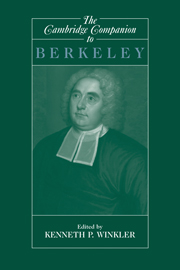Book contents
- Frontmatter
- Introduction
- 1 Berkeley’s life and works
- 2 Was Berkeley an empiricist or a rationalist?
- 3 Berkeley’s notebooks
- 4 Berkeley’s theory of vision and its reception
- 5 Berkeley and the doctrine of signs
- 6 Berkeley’s argument for immaterialism
- 7 Berkeley on minds and agency
- 8 Berkeley’s natural philosophy and philosophy of science
- 9 Berkeley’s philosophy of mathematics
- 10 Berkeley’s moral and political philosophy
- 11 Berkeley’s economic writings
- 12 Berkeley on religion
- Appendix
- Bibliography
- Index
3 - Berkeley’s notebooks
Published online by Cambridge University Press: 28 August 2006
- Frontmatter
- Introduction
- 1 Berkeley’s life and works
- 2 Was Berkeley an empiricist or a rationalist?
- 3 Berkeley’s notebooks
- 4 Berkeley’s theory of vision and its reception
- 5 Berkeley and the doctrine of signs
- 6 Berkeley’s argument for immaterialism
- 7 Berkeley on minds and agency
- 8 Berkeley’s natural philosophy and philosophy of science
- 9 Berkeley’s philosophy of mathematics
- 10 Berkeley’s moral and political philosophy
- 11 Berkeley’s economic writings
- 12 Berkeley on religion
- Appendix
- Bibliography
- Index
Summary
Berkeley graduated from Trinity College, Dublin, in 1704 and continued to live at Trinity in anticipation of becoming a Fellow of the College as soon as a vacancy arose. In 1707, having excelled in the examinations, he became a Junior Fellow. It appears to have been between 1706 and 1708, while he was still only in his early twenties, that Berkeley recorded his developing ideas in the pair of notebooks that are the subject of this chapter. These notebooks, which are now in the British Library, were never intended by Berkeley for publication. In addition to being interesting in their own right, the notebooks are an invaluable tool for understanding Berkeley's philosophy, and especially for understanding its development, for here we can see the genesis of many of the central claims of The New Theory of Vision (NTV), The Principles of Human Knowledge (PHK), and Three Dialogues between Hylas and Philonous (DHP).
- Type
- Chapter
- Information
- The Cambridge Companion to Berkeley , pp. 63 - 93Publisher: Cambridge University PressPrint publication year: 2005
- 2
- Cited by

